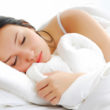Menopause is seen as a negative phase in a woman’s life. Menopause is a normal phase in life that every woman has to face. Instead of dreading menopause we should learn to embrace it. Enjoy this new phase of life the healthy and peaceful way.
The body changes during menopause. It can affect different aspects of your health and living. The transition can alter your physical and mental health. There are ways to balance out the stresses and physical symptoms of menopause. Keeping your body healthy and distressing your mind can do wonders for the physical symptoms.
Changing Your Diet:
- If you have problems with your bowel movements such as constipation and irregular bowel movements prior to menopause, it is in your best interest to fix it. Bowel movements are harder to remedy during menopause. Take in more fiber in your diet and drink lots of water. If you continue to have irregular movements talk to your doctor about options.
- Drink plenty of water every day, consume as much as one and a half liter a day. For coffee lovers out there it is best to cut down your coffee intake. A maximum of a cup of coffee or 2 cups of tea is enough. Reduce intake of alcohol and avoid smoking.
- Eat regularly and avoid skipping meals. As we grow older, our metabolic rate slows down. Skipping meals may make you gain weight or develop unhealthy eating habits. Reduce consumption of carbohydrates and increase intake of Phyto-estrogenic foods (soya, broccoli).
- Take in more calcium and fiber in your diet. Avoid eating foods that are high in sodium and sugar.
- Some people get hot flashes from certain foods such as caffeine, spicy food and alcohol.
Keep Your Body Fit:
- Use light weights to keep your body fit while lying around the house or watching TV. The little things you can do can help keep your body fit. Taking the stairs or jogging in the morning can keep menopause symptoms at bay.
- Working out at least 10 min in the morning and 10 minutes at night will help boost the mood.
- Menopause require a little bit more work in the fitness department due to the slower metabolism and the muscles require more work to maintain. Working out the muscles at least 3 times a week can help prevent it from shrinking.
Sleeping Habits:
- Some women have stated that they have problems falling asleep or having a peaceful slumber during the menopause transition.
- If your one cup a day caffeine fix is still keeping you up at night substitute it with decaf or drink nonfat milk instead.
- If your bowels are getting in the way of your sleep, then prevent drinking too much water before you go to sleep. If you’re going number 2 in the middle of the night cut down on dairy and high fiber foods.
- Is your mind keeping you awake? Write down what’s on your mind in a journal near your bed and write everything down from new thoughts to your to-do list for the next day. This will help clear your mind and prevent you from worrying about what you have to do in the morning.
- Relaxing your mind before going to sleep can help you fall asleep faster. Give yourself an hour of relaxation before bedtime. You can meditate or just lay in bed in silence.
Dealing with Stress and Mood Swings:
- If you are having severe problems with stress, consider talking to your doctor about medication you can take. If it is only minor stress give yourself some personal time to relax and practice breathing exercises.
- Menopause alters the hormone levels in the body, causing low moods and sadness. Learning to cope with them will be difficult but essential to having a healthy menopause. Instead of wallowing in misery go out and exercise. The body releases happy chemicals during exercise.
- Don’t keep your emotions bottled up, talk to your partner and your friends to prevent stressing yourself.
- Drinking is acceptable, but drinking in excess can lower the mood and cause irritation.
Supplements to Take:
- Calcium
- Iron
- Fiber
- Vitamin D
These tips can help your transition through your menopause in a healthier and more positive way. Other complication such as aging, breast pain and problems with the menstrual cycle will be unavoidable, but symptoms can decrease with a healthier lifestyle.












